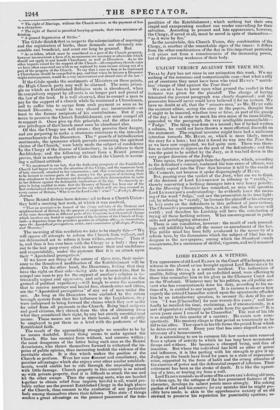UNJUST VERDICT AGAINST THE TRUE SUN.
TRIAL by Jury has not risen in our estimation this week. We say nothing of the notorious and unmentionable case—but what a silly set of creatures they must have been who tried HUNT'S " match- less" charge of libel against the True Sun!
We are at a loss to know upon what ground the verdict in that instance was given for the plaintiff. The charge of having fabricated the peccant paragraph was clearly disproved ; and the
prosecutor himself never could have believed it for an instant. We have no doubt at all, that the " seisseirs-man," as Mr. HUNT calls the assistant editor, seeing the story in the papers, thought that
it ought to be inserted, whether true or false, as part of the gossip of the day ; but in order to mark his own sense of its increlibility, appended to the paragraph the very intelligible monosyllable- " Fudge." The thing was done in a second ; but if he had written a column, he could not have thrown a more effectual discredit on the statement. The original inventor might have bad a malicious
intention towards Mr. HUNT, or, which is more likely, meant the story for a hoax ; but that it found its way into the True Sun as we have now suggested, we feel quite sure. There was there- fore no intention to injure on the part of the defendants ; and this was the point to be settled by the Jury, as it was laid down in the very proper direction of the Judge.
Then again, the paragraph from the Spectator, which, according to the defendant's counsel, contained the true cause of offence, was evidently copied into the True Sun because it told to the credit of Mr. Comeerr, not because it spoke disparagingly of HUNT.
But, passing over the verdict of the Jury, what are we to think of the decision of Lord LYNDHURST in refusing to " ceitify,"—
thereby converting a farthing damages into a very heavy penalty.
As the Morning Chronicle has remarked, no man will question Lord LYNDHURST'S understanding: he evidently knew the mean.
ing of the word " fudge," and saw the prosecution in its true light: yet, by refusing to " certify," he licenses the plaintiff or his attorney to levy costs on the defendants in this paltriest of prosecutions.
The Chronicle's presumption, then, is a fair one, that he never will certify ; and therefore his Lordship will have the satisfaction of trying all these farthing actions. What encouragement to paltry suits and pettifogging attornies ! There is one consolation, however: the result of such proceed- ings will infallibly bring all the sooner an amendment of the law. The public mind has been fully awakened to the necessity of a reform here, by the discussions which the subject of libel has un- dergone in the newspapers; among which the Standard stands conspicuous, for a succession of skilful, vigorous, and well-reasoned essays.
















 Previous page
Previous page